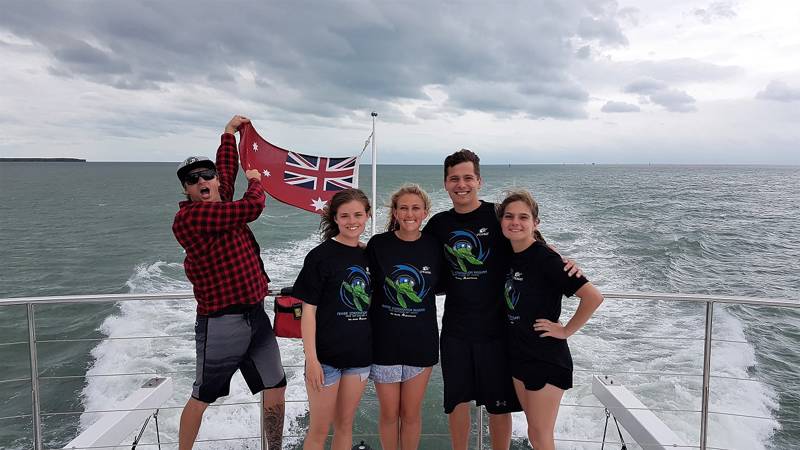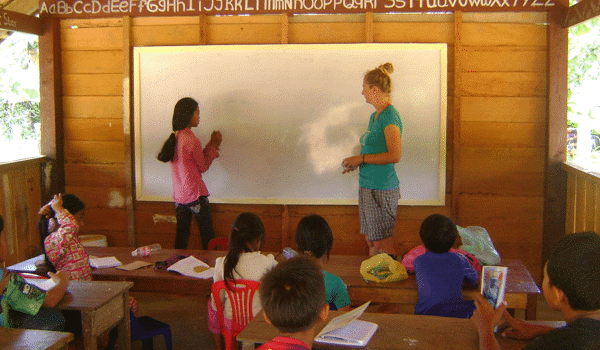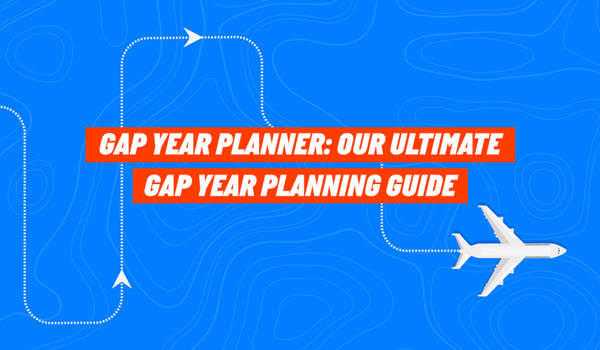Advice for parents with kids planning a gap year
So, your child has decided to take a gap year? Great news!
A gap year is a major milestone – for your child, but also for you as a parent. Watching your child spread their wings comes with its own set of emotions. In many ways, parents are stepping out of their comfort zone to let their child step into adulthood on their own terms.
You're no doubt feeling a mix of emotions - excited, nervous and perhaps a little overwhelmed. You might have a lot of questions swirling around. Is it a good idea? Will they be safe? How much will it cost?
If you’re currently supporting your child through their gap year, you’re not alone! And we're here to help.
In our parents’ guide to gap years, we highlight key considerations to help your child research, plan, fund, and enjoy their gap year.

Want to book your child's gap year with travel experts?
What is a Gap Year?
A gap year is time spent outside of formal education and permanent employment. It’s traditionally taken after finishing school or university but can happen at any stage in life.
There are countless options for a gap year. It can be a time for your child to figure out their next steps, explore a sector of interest, and visit new places.
While many associate gap years with travel, there are numerous other possibilities. Your child could volunteer, earn money, or learn new skills. We believe a gap year should be seen as a “year out,” not a “year off.”
There’s no set duration for a gap year. They often last a year, but some young people choose shorter periods, often combining them with work.
Shorter gap years are sometimes called 'mini gaps', typically lasting a few months.
What are the benefits of a Gap Year?
Young people take gap years for various reasons. Some need a well-deserved break between school and university and the hard work of GSCEs or A-Levels. Others are eager to travel before full-time employment. Some just need time to figure out their next steps.
Whatever the reason, your child will gain a lot from a gap year. For example, a gap year offers:
- The chance to explore the world and experience new cultures and destinations
- The opportunity to develop new skills that will enhance their CV and job prospects, and that are important to personal development
- The ability to work on problem-solving and communication, gaining confidence and maturity while being independent
- Time to think about their future path in education or their career
- The chance to improve their money-management skills
If your child is unsure whether to go to university or what to study, a gap year is a great opportunity to consider the options and apply to university without the stress of exams, but with guaranteed grades instead.
Some students worry about losing momentum with university applications or their career after a gap year, but there’s no need to panic. Research shows that gap year students who have spent their time productively are typically:
- More confident, independent, worldly, and invigorated individuals
- Skilled in teamwork, leadership, communication, and organisation
- Unique, with experiences that make them stand out
- Favoured by universities and employers for their maturity, motivation, and experience
How old should my child be for a Gap Year?
Ideally, your child should be 18 when they embark on their gap year, especially if they're considering spending time abroad. At 18 they'll have loads more options for what they can do.
Teenagers as young as 16 might be considering a gap year. And although it is entirely possible to take a gap year at this age, options might be slightly more limited. That's for a few reasons:
- Working holiday visas are not available until the age of 18
- Group tour operators often require 16 and 17 year-olds to be accompanied by an adult
- Volunteering projects sometimes have a minimum age requirement of 18
If your 16 or 17 year-old is considering a gap year, they can always start the planning and researching now, but aim to officially start their year out after their 18th birthday.
Otherwise, there are some organisations that have volunteer gap programs especially designed for younger teenagers (15-17), which may be a good option. And they could always stay in the UK to gain work experience here at home instead.
We offer gap year arrangements for those aged 18+, but we're always happy to help with the planning process before that important birthday.

What can my child do on their Gap Year?
There are so many ways to spend a gap year. Depending on how long your child wants to their gap year to be, they could combine a number of different activities for a well-rounded break from studies.
Here are just some of the possible options:
Go Travelling
When most people think of gap years they imagine travelling the world, exploring new countries and living out of a backpack. And for many people, that’s their gap year reality.
Before your child gets into a permanent career, gets a mortgage or takes on other responsibilities, they could spend their gap year abroad.
We whole-heartedly believe that travel makes for a better you, and as a result, a better world. Travel can make your more tolerant, more responsible and more open to opportunities.
And as student and youth travel specialists, it should come as no surprise that we encourage all young people to travel during their gap year!
Lucky for them, there are many popular gap year routes around the globe. Australia, New Zealand and North America are great options with no language barrier to content with. Southeast Asia is a backpacker favourite with a great infrastructure ideal for first-time travellers.
Then there's Central and South America for the chance to put your child's GCSE in Spanish to good use. Finally, Africa is another option. It’s hard to find a destination that hasn’t welcomed gap year travellers!

How volunteering can boost your child's CV
Volunteer Abroad
Gap years are also often associated with volunteering. Popular choices include volunteering in schools, with conservation or environmental organisations and helping with community projects.
Volunteering will give your child the chance to learn an incredible amount about themselves and others. It looks fantastic on their CV, and can transform their outlook on life.
In fact, volunteering abroad can significantly improve their career prospects by providing them with unique experiences and skills that stand out to employers. It demonstrates a willingness to step out of their comfort zone, adaptability, and a global perspective, all of which are highly valued in today’s interconnected world.
Work and Live Abroad
If your child wants to live abroad, and not only travel, then a working holiday visa is the ideal choice. With this type of visa they can live and work in countries including Australia, New Zealand and Canada.
There are many benefits of a working holiday, including:
- The opportunity to earn money to fund later travels
- Gaining work experience to help future job prospects
- Building independence living away from parents
- Making new friends in other parts of the world
Working holiday visas are available to British passport holders aged 18 and above, and allow young adults to spend up to three years in Australia and New Zealand, and up to two years in Canada.
Usually young working holiday makers will take up entry level jobs in hospitality and retail. But depending on your child's education and work experience, they may prefer to find work in an industry relevant to their future career goals.
Teaching
If your child hopes to go into teaching as a career, they can try out life in a classroom by teaching during their gap year. Even those who hope to go into a totally different career will gain new skills by spending time teaching. For example, they will quickly develop their interpersonal, communication and people management skills.
Those who want to teach English to non-English speakers often choose to gain a qualification first with a TEFL and CELTA course, before going on to a paid job.
Or perhaps your child would like to join a teaching program and become a volunteer teaching assistant overseas.
We have a number of volunteer projects that enable young adults to teach English or assist local teachers at kindergartens and schools.
Working in sports and camps
If your child loves sports, why not suggest sports coaching? There are a wealth of opportunities including working in a summer camp or adventure organisation.
They could also learn to be a ski or snowboard instructor or work as a chalet host. And if they are happiest in water, what about teaching water sports, such as sailing, diving or surfing?

Learn a new skill
A gap year is a great opportunity for your child to pick up some new skills.
If they're keen to explore Latin America, their Spanish GSCE or A-Level will definitely come in handy! And they can build upon their school education with a language course in countries like Mexico, Costa Rica, Colombia or Argentina. Check out our range of Spanish language courses for more information.
Nothing beats real-life experience and daily interactions when it comes to mastering a language. Plus, speaking a second language to intermediate level looks good on their CV.
Other skills your child could learn on their gap year include diving and surfing. As well as being challenging yet fun, it could spark a new passion or a love for the underwater world that results in a new career path.
How to fund a Gap Year?
Gap year budgets vary hugely, from those who travel on a shoestring to those who splash the cash. Budget also depends on where your child decides to go and what they decide to do - some activities are more costly than others.
However, it's safe to say that a gap year is going to cost a few thousand pounds.
You can help your child start to calculate a budget by encouraging them to research early on. Remind that they work through obvious costs, such as flights and accommodation, and to include ancillary costs, such as insurance and a rucksack.
Financial advice you could share includes:
- Setting up a spreadsheet to log their predicted costs and create a realistic budget
- Creating a dedicated savings account, which is only used for their gap year
- Encouraging them to look at their spending habits to find areas they can cut back on
Next, talk through how they can earn the money they need. You could suggest:
- Working before they travel.
- Working while they are travelling - many young adults choose to pick fruit, work in a bar or restaurant or do temping
- Fundraising activities to help drum up extra cash
For more ideas, check out our guide on How to Budget for a Gap Year.
Is a Gap Year Safe?
Most gap years go off without a hitch, but it’s always wise to be prepared. Ensuring your child has a well-thought-out itinerary is crucial, and it’s important to stress the need to book their first night’s accommodation in advance before arriving at a new destination. Remember, most gap years involve travelling to popular destinations that are accustomed to hosting young travellers.
Staying connected is easy with video calls and emails. Before your child leaves, look into the cost of using their phone abroad, including roaming charges. Sometimes, it might be cheaper to buy a pay-as-you-go phone in the destination country.
Here are some tips to help ensure your child’s safety:
- Communication: Before your child leaves, discuss how often you’d like to hear from them and why it’s important. They might not be able to call as often as you’d like, but a reminder to stay in touch never hurts.
- Travel with friends: Many young people choose to travel with a friend, which can ease some parental worries. Knowing your child has a travel buddy can be a big relief. If your child is planning to travel solo, they could join group tours designed for like-minded young adults for reassurance.
- Security measures: Look into thief-proof bags, bag locks, and anti-theft devices for their rucksack. A bag worn close to the body or a money belt worn under clothes can also be helpful.
- Insurance: Make sure they have the necessary insurance in place before they travel. Ask us for a quote on travel insurance.
- Safety precautions: Remind them to take the same precautions they would at home, such as avoiding walking alone at night and always letting someone know their whereabouts.
- Alcohol awareness: Discuss alcohol consumption. While they might not stay sober the entire trip, it’s important they don’t overdo it.
- First aid kit: Send them off with an emergency first aid kit. And make sure they have all of the necessary vaccinations before they travel. Check out our travel vaccination guide by country for more information.
- Cultural respect: Emphasise the importance of respecting local cultures and customs, and encourage them to research these before arriving at a destination.
- Reputable suppliers: Stress the importance of choosing reputable suppliers locally, especially for adventures and tours. Sometimes it pays to spend more for local activity operators with better quality equipment and guides.
- Essentials Checklist: There’s a lot to consider for a gap year, and we’ve compiled a list of essentials that people often forget, including insurance, documentation, visas, money, and vaccinations. You can download a copy via our Gap Year Planner.

Countdown to your child's gap year
Tips for a successful Gap Year
1. Change Your Thinking
Even though gap years are popular, some parents still have concerns about what it means for their child. You might worry that a gap year will set them back academically or that they might never go to university if they take a break from formal studies.
However, most students not only start university on time after their gap year but often perform better academically than their peers.
You might think your child isn’t ready yet or is too immature, but that’s actually a great reason to let them go! Travelling will give them the freedom and experiences they need to grow as individuals. They’ll come back with amazing stories and unforgettable memories, but also as more responsible, organised, and worldly-wise individuals.
2. Start Thinking About a Gap Year Early
The earlier your child starts planning their gap year, the more intentional their itinerary will be. Encourage them to explore opportunities early and keep an open mind. A variety of experiences is valuable - they'll gain even more skills.
A great starting point is visiting a local gap year fair. Check if your child's school arranges one during the academic year.
3. Good Communication is Essential
Begin planning by ensuring everyone is on the same page. Work together to agree on an outline that balances your child’s desires with your requirements. Set expectations together regarding accountability and decision-making. It’s helpful for parents to set parameters at the beginning and then allow your child the freedom to make decisions within a comfortable framework.
4. Research Together
Planning a gap year involves thorough research. The best advice for parents is to get involved in your child’s travel preparation. It’s natural to be worried, but participating in the planning process can help alleviate your fears. You can offer valuable advice on managing money, setting up a bank account, or finding paid work abroad.
If you choose to book your child's travel arrangements through a specialist student and youth travel agency (like us!), you can be involved in the itinerary planning from the get-go and will have the help of a dedicated travel advisor to make sure it all goes smoothly.
5. Be Clear on Who's Covering What
Perhaps your child is funding their own gap year. Or perhaps you're helping to bank roll the adventure. Either way, it's a good idea to make sure your child contributes financially to their gap year experience and has skin in the game. It'll also teach them valuable money management skills and the value of what money can buy in terms of life experience.
If you are paying for the majority of their gap year costs, to save disagreements and resentments, it's wise to be clear on expectations on how your want the money to be spent.
6. Help Your Child Prepare for Their Travels
Preparing for a gap year involves balancing preparation with learning to handle the inevitable bumps in the road. Create a checklist of tasks that need to be completed in the months leading up to departure. The physical tasks of preparing for a trip also help mentally prepare a student for leaving.
And it's a good idea to openly discuss how your child might cope with homesickness or loneliness while abroad. Come up with ways you might be able to help with this from home.
7. Take a Step Back
It can be tough to watch your child face challenges during their gap year, but allowing them to solve problems is part of the experience. Let your child navigate their own difficulties. Gaining confidence in their ability to handle travel misfortunes is part of the beauty of a gap year.
8. Stay in Touch While They Are Abroad
One of the main concerns once they are abroad is how to stay in touch. Thanks to the internet, staying connected is easier than ever. It’s important to agree on regular contact, but it’s equally important to find the right balance between parental concern and allowing them to learn to navigate the world independently.
9. Consider Meeting Your Child Abroad
If your child is planning to spend a considerable length of time away on their gap year, why not meet them somewhere along the way?
It's a great way to ward off any homesickness and loneliness they might experience, while providing you with an excellent opportunity to explore more of the world. You'll also get a glimpse of the grown-up your child is developing into after a few months spent away from home.
If they've been backpacking on a budget, they'll no doubt be thrilled by the prospect of spending a few nights or weeks at a nicer hotel, bank-rolled by their parents!

